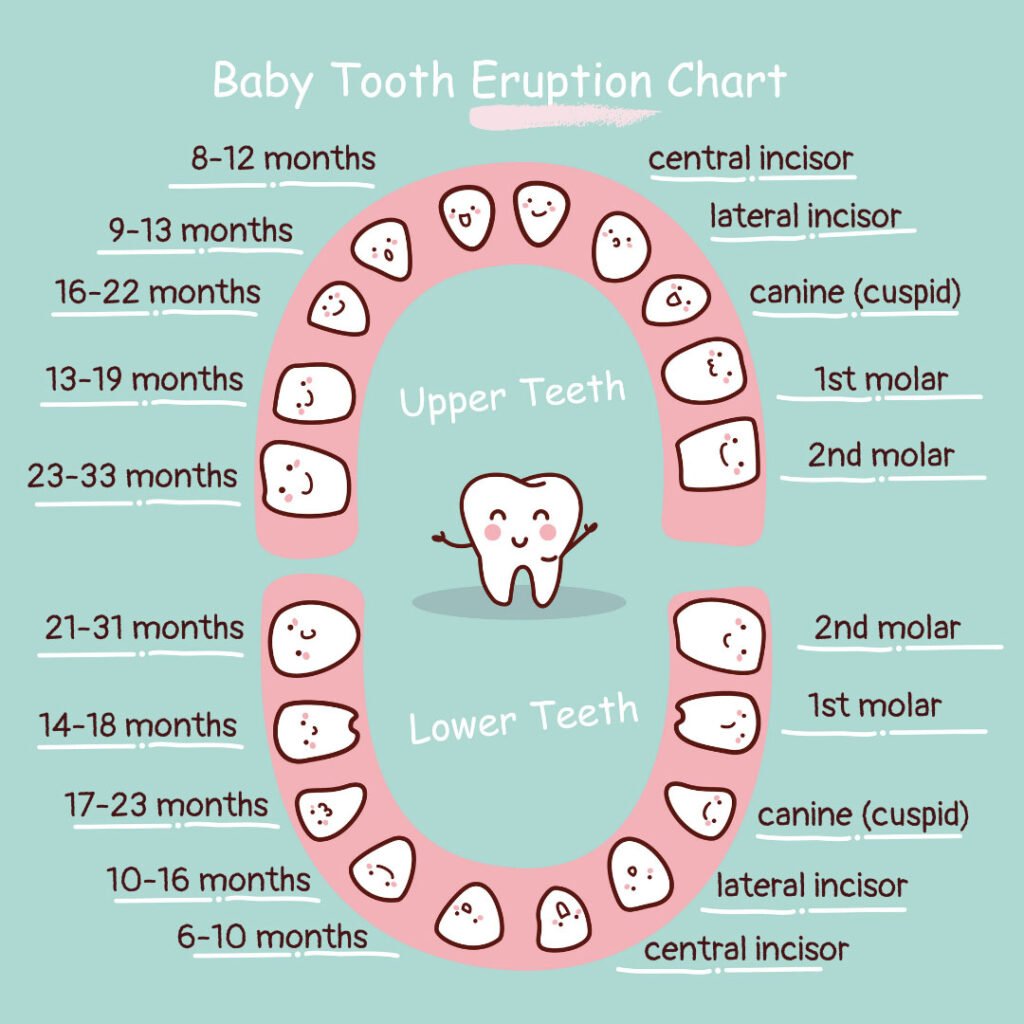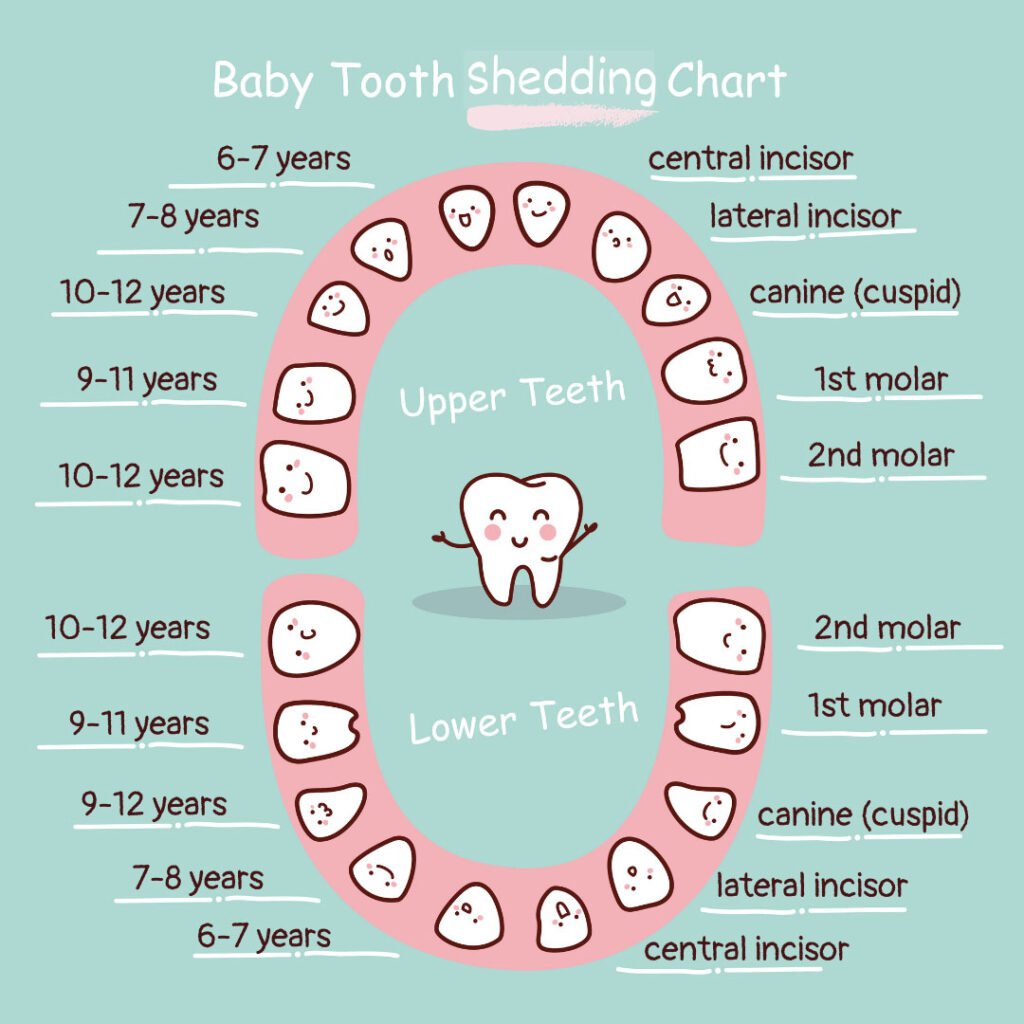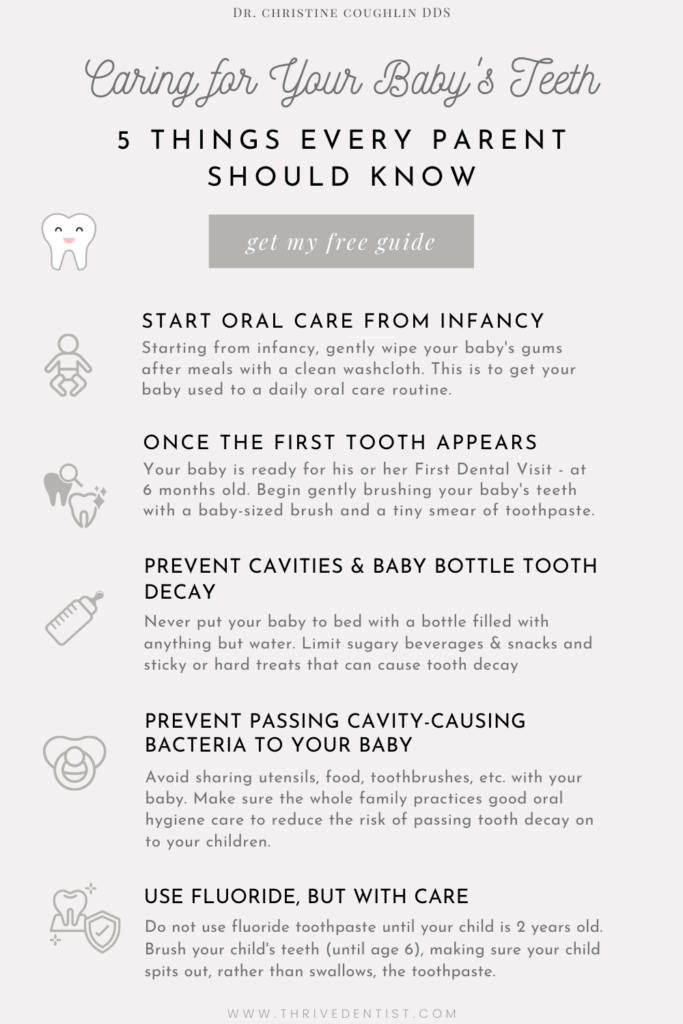Caring for your baby is a huge blessing and responsibility, and caring for their teeth is no exception. We want to make it easier for you, so we created this comprehensive guide to help you out.
Baby teeth: function and purpose
Just because baby teeth aren’t permanent doesn’t mean they’re not crucial to your child’s development. They allow your little one to chew, speak, and smile.
Baby teeth are also the “placeholder” for permanent teeth. They also help your baby’s mouth and haw muscles to develop correctly.
Taking good care of these is very important for your child’s early oral health.
When do baby teeth come in?
Most parents have no idea when their baby’s teeth are supposed to come in or fall out.
Did you know that your baby already has a full set of teeth under the gums, waiting to erupt?
Do all babies get their first teeth at the same time? Nope. Every baby is different.
Multiple factors determine the age of tooth eruption, including genetics and birth size.
What are the symptoms of teething?
- Increased drooling
- Lower sleep quality
- Irritability and fussiness
- Refusing food
- Hands in the mouth
- Ear pulling
- Low-grade fever
These are signs of your baby dealing with the discomfort of teeth pushing through their gum line.
The lower teeth usually come in first; typically, your baby’s first lower central incisors (bottom front teeth) at four to seven months of age. Next come the upper central incisors, then the lateral incisors (the teeth next to central incisors).
If your baby’s teeth don’t erupt in this order, don’t be alarmed; it’s not uncommon to see the upper teeth come in first.
Between your child’s 1st birthday and 19 months, you will see the first molars appear. You can expect more crying and irritability from your baby during this time as this can be more painful than the other eruptions.
At 17-23 months, the canines will appear, followed by second molars at 25-33 months. You made it! That was the last of the teething pains as the second molars are the last to erupt in the process.
TEETHING REMEDIES
Teething remedies have been around for ages, but not all of them are created equal.
Here’s what works best for teething relief:
- Massage: massaging your baby’s gums with clean hands can bring immediate relief.
- Teething gloves: these teethers keep hands out of the mouth while providing pain relief.
- Chamomile: a plant extract that can soothe teething pains naturally. Freeze some chamomile tea into a popsicle, or try a clean washcloth soaked in the tea. You can even freeze the soaked washcloth for extra relief.
- Try this all-natural homemade popsicle recipe with anti-inflammatory ingredients like turmeric and ginger.
- https://askthedentist.com/a-dentists-homemade-teething-remedy-gum-soothing-popsicles/
What to avoid
Some popular teething remedies can be dangerous to your baby’s health over time.
Avoid numbing creams that the FDA warns can decrease blood oxygen levels in babies. And popular teething gels can carry severe risks like allergic reactions, seizures, and blood disorders.
There are even some homeopathic teething tablets that have been recalled, so don’t take the risk. And finally, avoid liquid-filled teething rings due to the risk of bacterial contamination.
Baby teeth eruption charts


Baby teeth care at home
As the parent, you play the role of your child’s model and introduction to caring for their oral health.
But don’t be intimidated; good oral hygiene for kids is easy with our Caring for Your Baby’s Teeth Guide: (click on the photo below to download)
- Try an alternative non-toxic toothpaste rather than the traditional toothpaste that contain toxic ingredients, which can be dangerous if ingested in large amounts.
- Brush any erupted teeth after every meal to guard against plaque.
- Brush gently and target the gums: use gentle circular motions at a 45-degree angle to the gums.
- Breastfeed if possible (but no shame if this isn’t an option for you): Breastfeeding can significantly benefit oral development and vitamin k12 levels.
- Make tooth brushing fun and interactive with your child rather than forcing it on them.
- Avoid letting your baby go to sleep with a bottle – this can lead to decay and plaque buildup.
- Help your child form great lifelong habits for brushing their teeth by teaching them, rather than doing it all yourself.

Baby teeth care at the dentist
First dental visit
Your child’s First Dental Visit should be when the first little tooth appears – around age six months. Make sure to bring your child in at least by their first birthday. This allows them to get used to coming to the dentist and learn that dental visits are an essential part of life.
What to expect at your baby’s first dental visit
At your baby’s first dental visit, we will make sure your baby’s mouth is developing correctly and guide the early development of the upper and lower jaw and the bite. This can save you money and complications in orthodontic treatment later on.
You can expect an examination to make sure the mouth tissue, bite, and teeth eruptions are developing correctly. We will take an x-ray if there is any visible tooth decay. Finally, we will polish your baby’s teeth to remove any plaque and give you advice for caring for their teeth at home.
When should baby teeth fall out?
Baby teeth start to fall out as the root disintegrates and the tooth hollows, leaving behind a reddish colored tissue underneath. It’s also common for one of your kid’s permanent teeth to grow in behind a baby tooth.
Having two rows of teeth is not uncommon and is rarely an issue. However, when they’re both the same height, you should see the dentist. Sometimes, we may need to extract the baby teeth if they don’t fall out on their own.
Baby teeth generally fall out in the order they erupt:
- Age 6-8 yrs: Incisors fall out first
- Age 9-12yrs: the canines fall out
- Age 9-11yrs: the first molars will go
- Age 10-12yrs: the second molars will go
Baby teeth care: after losing a tooth
How to care for your child’s mouth after losing a tooth?
- Rinse with warm salt water, especially if there is blood.
- Then continue regular oral hygiene, but make sure your child isn’t brushing too hard around the empty space, which will irritate the gums.
- Make sure your child is brushing and flossing as usual, even during tooth loss.
If your child’s baby tooth falls out earlier than expected, see your dentist. Now that the permanent teeth are growing in, your child’s oral health is even more crucial!
And don’t forget to include the Tooth Fairy to make the process fun and memorable for your child!
Baby teeth care: summary
Although baby teeth may seem unimportant, properly caring for them can set your child up for lifelong healthy dental health and habits.
Each baby’s teeth come in at different times, so teeth eruption charts can provide a good idea of what to expect.
When it comes to your child’s dental health, early intervention is crucial, and excellent oral hygiene begins at home.
Enjoy the dental milestones of this journey with your child, and make it fun!
Learn more:



